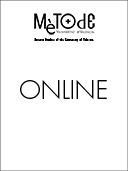Scientific ethos and the cinematic zombie outbreak: Science in fictional narratives
DOI:
https://doi.org/10.7203/metode.6.4472Palabras clave:
rhetoric of science, frontier of science, science fiction, viral pandemics, public attitudes toward science Resumen
Resumen
Public anxiety about emerging biothreats is evident in the recent glut of popular entertainment where the demise, or near demise, of humankind is imagined to be the result of a new infectious pathogen against which science has no existing vaccine or cure. This article examines the figure of the scientist in such fictional narratives and what these characterizations indicate about public attitudes toward science in our contemporary world. It focuses in particular on the image of the scientist as clumsy naïve, immoral experimenter, heroic savior, and self-reflexive ethical agent.
 Descargas
Descargas
 Citas
Citas
Boluk, S., & Lenz, W. (2010). Infection, media, and capitalism: From early modern plagues to postmodern zombies. The Journal for Early Modern Cultural Studies, 10, 126–147.
Boyle, D. (Director), & Macdonald, A. (Producer). (2002). 28 days later [motion picture]. United Kingdom: Fox Searchlight Pictures.
Ceccarelli, L. (2013). On the frontier of science: An American rhetoric of exploration and exploitation. East Lansing, MI: Michigan State University Press.
Collins, F. S. (2005, August 7). Exploring the frontiers of life: Northwest at forefront of pioneering effort to mine the secrets of the human genome. The Seattle Times. Retrieved from: http://www.seattletimes.com/opinion/exploring-the-frontiers-of-life
Forster, M. (Director), Bryce, I., Gardner, D., Kleiner, J., & Pitt, B. (Producers). (2013). World War Z [motion picture]. United States: Paramount Pictures and Skydance Productions.
Halperin, V. (Director), & Halperin, E. (Producer). (1932). White zombie [motion picture]. United States: A Victor and Edward Halpern Production.
Haynes, R. (2003). From alchemy to artificial intelligence: Stereotypes of the scientist in Western literature. Public Understanding of Science, 12, 243–253. doi: 10.1177/0963662503123003
Klosterman, C. (2010, December 3). My zombie, myself: Why modern life feels rather undead. New York Times. Retrieved from: http://www.nytimes.com/2010/12/05/arts/television/05zombies.html?pagewanted=all&_r=0
Lawrence, F. (Director), Goldsman, A., Heyman, D., Lassiter, J., & Moritz, N. H. (Producers). (2007). I am legend [motion picture]. United States: Warner Brothers Pictures.
Romero, G. A. (Director), Hardman, K., & Streiner, R. (Producers). (1968). Night of the living dead [Motion Picture]. United States: An Image Ten Production.
Watts, E. K. (2014). ‘The incessant moan’: Reanimating zombie voices. Carroll C. Arnold Distinguished Lecture 2013. Washington D. C.: National Communication Association. Retrieved from: https://www.natcom.org/uploadedFiles/Convention_and_Events/Annual_Convention/NCA Manuscript 2014_FINAL.pdf
Weingart, P. (2003). Of power maniacs and unethical geniuses: Science and scientists in fiction film. Public Understanding of Science, 12, 279-287. doi: 10.1177/0963662503123006
Descargas
Publicado
Cómo citar
-
Resumen1624
-
PDF 1679
Número
Sección
Licencia
![]()
Todos los documentos incluidos en OJS son de acceso libre y propiedad de sus autores.
Los autores que publican en esta revista están de acuerdo con los siguientes términos:
- Los autores conservan los derechos de autor y garantizan a Metode Science Studies Journal el derecho a la primera publicación del trabajo, licenciado bajo una licencia de Creative Commons Reconocimiento-NoComercial-SinObraDerivada 4.0 Internacional, que permite a otros compartir el trabajo con un reconocimiento de la autoría del trabajo y citando la publicación inicial en esta revista.
- Se permite y se anima a los autores a difundir sus trabajos electrónicamente a través de páginas personales e institucionales (repositorios institucionales, páginas web personales o perfiles a redes profesionales o académicas) una vez publicado el trabajo.





